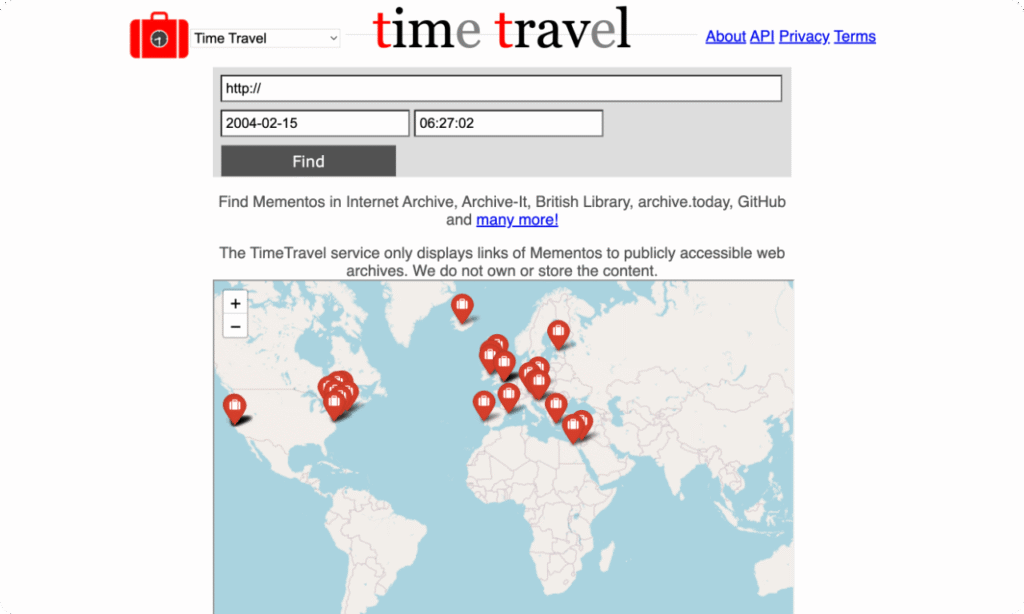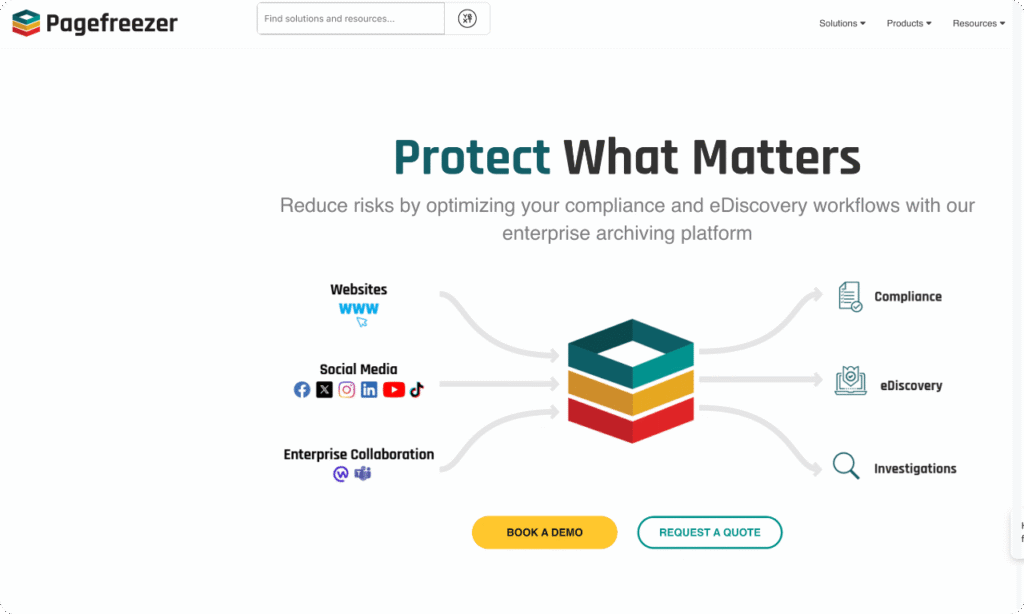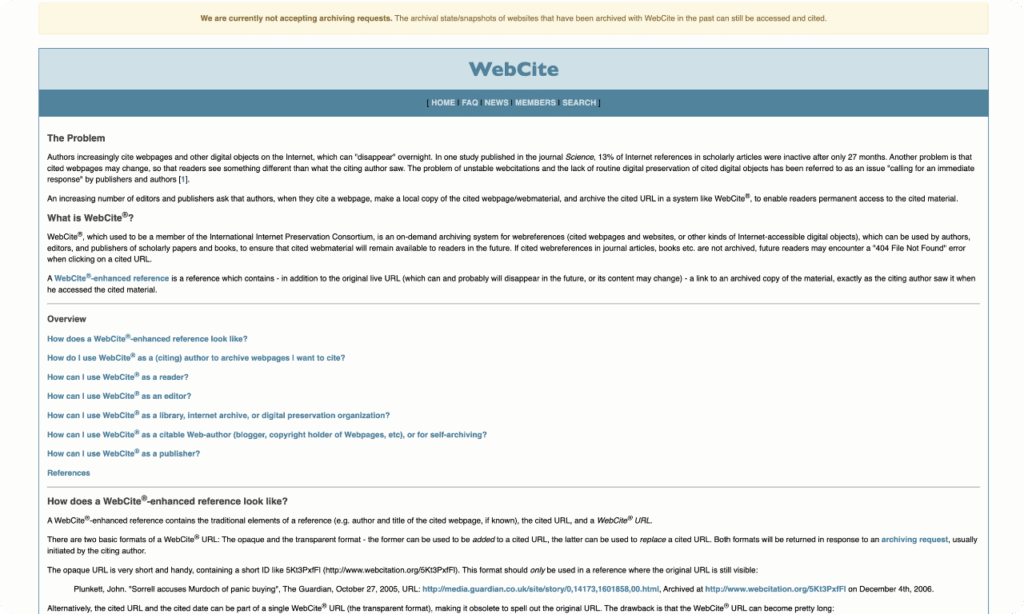A major security breach has exposed over 31 million emails and passwords, pushing Wayback Machine users to look for safer options.
The Wayback Machine boasts an impressive archive of 916 billion digital assets, including web pages, books, and software applications. Users can now choose from several excellent alternatives that provide unique features – from instant website snapshots to specialised academic archiving.
My tests revealed 7 reliable alternatives that work well in 2024. The options range from PageFreezer’s regulatory compliance tools to Perma.cc’s academic-focused platform. These alternatives come in both free and premium versions to suit different archiving needs.
7 Alternatives to Wayback Machine
- Memento
- Archive Today
- Pagefreezer
- Webcite
- Mirrorweb
- Github
- Country-Specific Archives
Memento Time Travel

Memento Time Travel stands out from other archiving tools. It’s a tool that combines web archives from multiple sources into one place. The sort of thing I love about it is how it doesn’t just create its own archive. It searches through many existing web archives at the same time.
Memento Time Travel features and functionality
Memento Time Travel runs on an advanced HTTP-based framework. The system adds datetime negotiation capabilities to standard web protocols. This setup lets users find old versions of web pages from multiple archives through one simple interface.
The system works through four main parts:
- Original Resource (URI-R): The current or past web resource you want to find archived versions of
- Memento (URI-M): A past version of the original resource from a specific point in time
- TimeGate (URI-G): The part that finds the best archived version based on your chosen date
- TimeMap (URI-T): A list showing all available archived versions from participating archives
This system connects the past and present web through datetime negotiation. It’s a type of content negotiation that uses a resource’s URI and your preferred datetime. Memento pulls results from many sources. These include Internet Archive, Archive-It, British Library, archive.today, GitHub, and several other archives.
Memento Time Travel use cases for SEO and research
SEO professionals and marketers find great value in Memento Time Travel. The tool combines archives from many sources. This makes it perfect to get detailed historical data and analyze competitors.
Searching through archives of all types makes Memento perfect for:
- Market research: You can track industry trends and competitive strategies by looking at how websites changed over time
- Long-term competitive analysis: The tool helps you study competitors’ past strategies through their old web content
- Evidence gathering: IP attorneys can find evidence of prior art or trademark infringement through archived website versions
- Citation preservation: Creating snapshots of pages and unbreakable links is vital for academic citations
Memento really shines when a specific page snapshot isn’t in one archive but exists in another. Your chances of finding historical information go up by a lot compared to using just one archive service.
Memento Time Travel availability and access
Getting started with Memento Time Travel is easy and free. You’ll find the main site at timetravel.mementoweb.org. It offers a simple interface to search archives.
Browser extensions provide the best way to use Memento. They turn your browser into a time machine:
- Chrome Extension: The Chrome Web Store has it. You get a Memento submenu when you right-click
- Firefox Extension: Works just like the Chrome version. You can switch between present and past web content easily
Both extensions work the same way. Click the Memento icon to pick a date for time travel. Then right-click on a webpage and select “Get near…” to see that page from your chosen date.
These extensions come with useful features:
- Red icon shows when you’re viewing a past version
- Quick return to current version
- Check old versions of any link on a page
- Fix “Page Not Found” errors by showing the latest archived version
On top of that, it gets old versions from web archives worldwide. This includes big collections like the Internet Archive, national archives such as the British Library and UK National Archives, and quick services like archive.is.
Memento Time Travel proves to be a fantastic wayback machine alternative. Its unique approach brings multiple archives together. The tool doesn’t compete with existing archives. Instead, it makes their combined content available through one simple interface.
Archive.today

Archive.today is a dedicated web preservation tool that creates permanent snapshots of webpages whenever you just need them. Since 2012, this straightforward service (formerly known as archive.is or archive.ph) has become a prominent alternative to wayback machine for instant website preservation.
Archive.today snapshot capabilities
Archive.today stands out from other wayback machine alternatives because it knows how to capture websites exactly as they appear at a specific moment. The service takes two distinct snapshots at once:
- A complete replica that preserves functional live links
- A full-page screenshot for visual reference
This dual-capture approach will give a record with both interactive and static versions of the same page. The service excels at preserving JavaScript-heavy websites that other archives struggle with, especially when you have complex sites like Google Maps and social media platforms.
Unlike the Wayback Machine that uses automated crawling, Archive.today creates snapshots only when users ask for them. This on-demand approach helps preserve content that might vanish quickly. The service captures text and images well, though it doesn’t store PDFs, binary files, or video content.
The sort of thing i love is the text selection tool – highlighting specific text lets Archive.today generate a URL fragment that automatically highlights that same portion when shared. This makes it easy to reference specific information on lengthy webpages.
Archive.today for journalists and researchers
Journalists now see Archive.today as a crucial tool to preserve evidence. It creates permanent, unalterable records that are a great way to get documentation of important statements or social media posts that might disappear later.
Researchers find several benefits with Archive.today:
- Creates citation-ready permanent links to archived content
- Preserves pages exactly as they appeared at capture time
- Stores snapshots indefinitely with no expiration date
- Works well with modern websites including social media
The search features add more research value. Archive.today offers advanced keyword operators and domain-specific searches through its research toolbar. You can use quotation marks to search exact phrases and asterisks as wildcards. The search runs on Google CustomSearch (with Yandex Search as backup) and helps locate previously archived content effectively.
Archive.today doesn’t follow robots.txt exclusions because it acts “as a direct agent of the human user”. So it might preserve content that other archives skip, making it valuable to complete research.
Archive.today browser tools and mobile access
Archive.today becomes easier to use with its browser extensions and mobile tools. These tools make archiving simpler across platforms:
Desktop browsers like Chrome, Firefox, and Microsoft Edge have extensions available. They add useful features like:
- One-click archiving from a toolbar button
- Context menu options to archive current pages or links
- Automatic URL sanitizing to improve archiving accuracy
- Options to view the newest archived version of a page
Mobile users can access Archive.today through specialized apps. Android users get Share2Archive, which adds an archiving option right in the share menu. This lets you quickly archive any URL while browsing on mobile. iOS users can use ArchiveApp, though it has some limitations compared to Android.
These tools are free to use, and you don’t need an account to save or access archived pages. This accessibility has made Archive.today one of the strongest wayback machine alternatives, particularly for users who just need quick, reliable archiving of modern websites.
PageFreezer

PageFreezer gives organizations a resilient solution for legally defensible web archives that puts compliance first. This wayback machine alternative excels with its tamper-proof technology and industry-specific archiving features.
PageFreezer compliance-ready archiving
The platform meets strict regulatory compliance and legal requirements. The system creates tamper-proof records with several key security elements:
- Digital signatures and timestamps verify when content was archived
- Cryptographic hash values prevent tampering and ensure authenticity
- Secure encryption protects all stored data in compliance with regulatory standards
- Defensible exports in various formats for audits and eDiscovery
The system automatically crawls sites at set intervals and captures every update. This includes deletions, multimedia content, and interactive elements. The automation ensures complete content capture during archiving.
PageFreezer stands out from simple wayback machine alternatives with powerful search capabilities. Users quickly find specific pages, keywords, or metadata throughout the archive. This feature is a great way to get quick information during legal proceedings or compliance audits.
PageFreezer for regulated industries
The platform serves organizations in heavily regulated sectors where strict documentation requirements exist and compliance failures lead to major penalties. Their documentation shows the platform serves multiple sectors:
Financial services companies rely on PageFreezer to meet recordkeeping regulations for online communications. The system helps financial institutions prevent data loss by monitoring online channels and storing all data for regulatory audits.
Healthcare organizations employ PageFreezer to handle HIPAA compliance challenges and manage risks with website content, social media, and team messaging apps. The system monitors communications to maintain healthcare advertising regulations.
Government agencies work with PageFreezer for open records compliance and transparency initiatives. The system speeds up responses to Freedom of Information Act (FOIA) requests by preserving online data with up-to-the-minute data analysis.
Legal departments gain from PageFreezer’s eDiscovery features. Organizations can place content on legal hold and override standard retention schedules during litigation.
The platform helps regulated entities capture and preserve four main types of online data: website content, social media accounts, enterprise collaboration platforms, and mobile text messages. This detailed coverage ensures proper archiving of all digital communications.
PageFreezer free vs paid options
PageFreezer offers a free trial period to test its capabilities, but no permanent free version exists. The platform runs on a subscription model, unlike some wayback machine alternatives.
Each organization gets custom pricing based on specific requirements. This makes sense as different industries and organization sizes have varying needs. To cite an instance, a small legal firm has different archiving needs than a large financial institution.
The company builds solutions around specific business needs instead of standard packages. Most organizations start with their simple plan.
New users can try the free trial to review if PageFreezer fits their archiving needs before buying a paid plan. Users test features like tamper-proof archiving, search capabilities, and export functions without upfront costs.
PageFreezer stands among the best wayback machine alternatives for organizations that just need more than simple web archiving. The focus on compliance, regulatory requirements, and legal defensibility helps businesses in regulated environments with strict documentation standards.
WebCite

WebCite started as a scholarly citation tool and still serves as an important wayback machine alternative, even with its limits today. The platform filled a gap that other systems don’t deal very well with – it saves cited web content exactly as it looked when scholars referenced it in their work.
WebCite academic and legal archiving
What makes WebCite stand out from other wayback alternatives is its focus on saving web references used in academic papers and books. The team built this platform to stop the “404 File Not Found” error that often shows up when web content vanishes or changes.
WebCite creates what they call “WebCite-enhanced references” – these are citations that show both the original URL and a permanent link to the saved version. This approach will give a reader access to the exact content version authors cited, even years later.
Academic circles embraced the platform quickly. Almost 200 journals merged WebCite into their publishing systems right after its 2005 launch. The platform helped scholars in several ways:
- Saved exact snapshots of cited web pages to verify later
- Created permanent records to document academic work
- Made lasting links for research papers
- Helped proper attribution in scholarly work
WebCite’s terms clearly state that users can only use it for scholarly purposes. The platform won’t let you use archived content for legal cases. This shows how WebCite focused purely on academic archiving rather than collecting legal evidence.
WebCite manuscript upload and citation tools
Authors can save web content through WebCite in different ways while writing manuscripts. The basic method lets you archive single cited webpages through their “archive page” feature. You can also upload entire manuscripts to WebCite, which finds and saves all cited URLs at once.
This “combing” feature changes how citations work in academic publishing. The system handles manuscripts by:
- Finding all non-journal URLs in the document
- Saving each cited webpage
- Switching original URLs with permanent WebCite links
WebCite also works with editors and publishers through special tools. Journal editors can add WebCite to their author guidelines to encourage early archiving. Publishers can send their “citing articles” to automatically save all references before publication.
Users can find saved content through several methods:
- WebCite ID (snapshot ID)
- URL plus publication date
- URL with the citing article’s DOI
WebCite current availability and limitations
WebCite no longer takes new archiving requests. This sets it apart from other active wayback machine options. Notwithstanding that, you can still access previously saved content to retrieve and cite existing snapshots.
The platform’s spotty availability creates another issue. The service stayed offline for nearly two years between 2021 and 2023. These outages make it nowhere near as reliable as newer wayback machine alternatives.
Authors can still cite web material from WebCite for free. The platform used a membership model like CrossRef for publishers while keeping it free for individual scholars.
With these current limits, researchers who just need active archiving might look at options like Archive.today or Memento. Still, WebCite’s existing archive helps academics access older preserved citations, especially content from its peak period after launching in 2005.
MirrorWeb
MirrorWeb serves as a specialized archiving solution for regulated industries. This UK-based service combines advanced analytics with compliance-focused features. It works as a powerful wayback machine alternative for enterprise users. The 5-year old cloud-based platform now stands as a trusted archiving partner for some of the world’s most prestigious organizations.
MirrorWeb analytics and reporting features
MirrorWeb distinguishes itself from simple wayback machine alternatives through sophisticated analytics and reporting capabilities. Users can perform full-text searches through all archived content. This helps them find specific information quickly within massive archives. The platform’s achievement speaks for itself – it launched over a million crawls in the last five years.
The platform’s reporting tools has:
- Immediate monitoring of websites, social media, and communications
- Lexicon policies that automatically flag problematic content
- Sentiment analysis capabilities to understand customer participation
- Complete audit trails with date and time stamps to verify compliance
The platform captures dynamic web content that competitors don’t deal very well with, including JavaScript-heavy applications built with React, Angular, and Vue. This fidelity will give archived pages their original functionality and appearance.
MirrorWeb for finance and government sectors
MirrorWeb targets two sectors with specialized compliance needs. Financial services firms can use the platform’s detailed archiving solutions that meet regulatory requirements from authorities like the SEC, FINRA, FCA, and ASIC. Financial institutions can capture and preserve communications in channels of all types:
- Websites (both public and password-protected)
- Social media accounts across major platforms
- Mobile communications (SMS, WhatsApp, WeChat, Telegram)
- Email and internal collaboration tools
The government sector employs MirrorWeb as their official archivist worldwide. The platform helps government bodies meet record-keeping requirements by preserving their digital footprint. The platform’s collaboration with the UK National Archives resulted in migrating 120TB of data (5.5 times the complete Netflix film catalog) to the cloud in just two weeks.
Both sectors benefit from MirrorWeb’s adherence to the WARC/ISO28500 standard. This makes archives easily portable to other preservation systems when needed.
MirrorWeb pricing model and access
MirrorWeb’s pricing structure doesn’t include a permanent free version or trial based on available information. The company provides tiered subscription options that match different organizational needs:
Insight Starter – Built for small firms with 1-20 employees, has weekly website captures and simple monitoring features
Insight Stack – A detailed solution with daily website captures and expanded monitoring capabilities
Insight Enterprise – Custom offerings for large organizations with multi-firm access controls and personalized support plans
Users access MirrorWeb through their cloud-based SaaS platform at app.mirrorweb.com. They can log in via standard authentication or Single Sign-On (SSO) based on their organization’s setup. The platform’s easy-to-use interface “looks and feels like the modern apps that our customers use every day”.
The platform also has specialized mobile applications like Trusted Contacts. This app separates business and personal communications on the same device. It solves a major compliance challenge in regulated industries where employees use personal devices for work.
While MirrorWeb doesn’t offer free options like other wayback machine alternatives, it makes up for it. The platform provides enterprise-grade features specifically designed for organizations with strict regulatory requirements.
GitHub
GitHub has evolved into a powerful wayback machine alternative with unexpected archiving capabilities that go beyond traditional web archivers. While most archive tools focus only on websites, GitHub preserves code, documentation, and digital assets with meticulous attention to longevity.
GitHub as a code and content archive
GitHub’s archiving capabilities are much more than typical version control. The GitHub Archive Program takes a groundbreaking approach to digital preservation by creating multiple backups in a variety of storage mediums that ensure open source software survives long-term.
A remarkable achievement occurred on February 2, 2020, when GitHub captured a complete snapshot of all active public repositories. These repositories now rest in the Arctic Code Vault—a decommissioned coal mine beneath an Arctic mountain in Svalbard, Norway. This film-based archive should last 1,000 years, making it one of the most durable wayback machine alternatives.
Through collaboration with prestigious institutions, GitHub ensures additional preservation:
- The Bodleian Library (Oxford)
- Bibliotheca Alexandrina (Egypt)
- Stanford Libraries (California)
These strategic collaborations store museum-quality cases containing 17,000 of GitHub’s most popular projects, which creates multiple preservation points for critical open source code.
GitHub for developers and cybersecurity experts
GitHub offers specialized security features through its Security Lab that cybersecurity professionals can use as wayback machine alternatives. The platform maintains the GitHub Advisory Database with over 22,000 security advisories and 7,500+ CVEs assigned for open source maintainers.
GitHub stands apart from traditional web archives by providing developers with complete security context beyond simple identification. The Security Lab improves security by promoting global cooperation between developers and researchers worldwide.
Compared to other archiving platforms, GitHub helps advance cybersecurity careers by letting professionals showcase skills, learn from others, and contribute to open source security initiatives. This creates two benefits—code preservation and security expertise development.
GitHub free vs business plans
GitHub provides both free and paid plans if you have specific archiving needs. The free plan includes unlimited public and private repositories with unlimited collaborators, making it available for simple archiving needs.
Free users get 500MB of GitHub Packages storage and can use GitHub Actions for automation. After archiving, repositories remain searchable but become read-only.
“Archiving” on GitHub means making repositories read-only instead of deleting them. This approach preserves content while stopping new contributions—perfect for historical preservation of completed projects.
GitHub Team and Enterprise plans provide advanced security features, more storage, and additional compliance controls for users who need better archiving capabilities. Enterprise users can access GitHub Advanced Security as an optional add-on for complete security coverage.
Organizations can connect GitHub with third-party repositories like Zenodo for stronger preservation. This integration assigns a digital object identifier (DOI) to code, which makes it persistently identifiable and discoverable—a crucial feature for any serious wayback machine alternative.
Country-Specific Web Archives
National libraries around the world now offer specialized web archives that work as excellent wayback machine alternatives when researching specific locations. These digital repositories capture unique elements of each country’s online heritage that bigger global archives might overlook.
Examples of country-specific web archives
Countries of all sizes maintain their own detailed web archives, which anyone can access free of charge:
- UK Web Archive – Preserves UK-based websites including government, cultural, and academic content
- Library of Congress Web Archive – Features specialized collections on US elections, Supreme Court changes, and international political events
- Australian Web Archive – Has three collections: PANDORA (selective archiving), Australian Government Web Archive, and Domain Harvest collection
- National Library of Ireland Web Archive – Archives chosen Irish websites of scholarly, cultural and political importance
The Croatian Web Archive, Web Archive Singapore, and Greek Web Archive Portal stand out as notable additions. More than 30 national libraries now run web archiving programs. Most operate under legal deposit mandates that let them collect digital publications.
Use cases for localized historical research
These country-specific archives shine at preserving materials valuable to genealogical and historical research. Local History Web Archives store newsletters, blogs, name indexes, and magazines. Researchers use these resources to connect ancestors with specific locations and time periods.
These collections meet specialized research needs, from electoral pattern studies to cultural trend tracking. The Library of Congress archives country-specific events like the Bangladeshi General Elections and Brazilian Presidential races. The UK Government Web Archive helps researchers analyze political developments through preserved government communications.
Integration with Archive-it and Memento
Rather than working alone, most country-specific archives connect through bigger frameworks. Archive-It works with over 400 institutions, including state libraries and historical societies. They create specialized collections covering topics from Black Lives Matter to Olympic Games.
The Memento protocol makes shared access better by enabling datetime negotiation across multiple archives. This technology lets researchers view specific versions of web resources from particular moments in time. The UK Government Web Archive became available through Memento’s “Time Travel for the Web” protocol. Users can now “slice” into archives and see resources across different time periods.
Comparison Table
| Archive Service | Website | Main Focus | Key Features | Availability |
|---|---|---|---|---|
| Memento Time Travel | timetravel.mementoweb.org | Multi-archive aggregator | – Searches multiple archives at once – Browser add-ons ready to use – Handles date and time requests | Free |
| Archive.today | archive.today | Web preservation on request | – Captures both interactive view and screenshots – Supports JavaScript – Lets you select text – Browser tools included | Free |
| PageFreezer | pagefreezer.com | Legal and compliance archiving | – Records that cannot be altered – Automatic web crawling – Smart search tools – Meets regulatory standards | Paid (Trial available) |
| WebCite | webcitation.org | Academic citation storage | – Archives focused on citations – Handles manuscripts – Works with DOI system | Free (Not taking new archives) |
| MirrorWeb | mirrorweb.com | Business compliance archiving | – Smart tracking tools – Immediate monitoring – Meets regulations – Handles changing content | Paid |
| GitHub | github.com | Code and project storage | – Keeps files safe long-term – Strong security – Tracks all changes – Arctic Code Vault backup | Free and Paid plans |
| Country-Specific Archives | Various national library websites | National digital heritage | – Focus on local content – Stores government files – Preserves culture – Links to other archives | Mostly Free |
Conclusion
Different Wayback Machine alternatives serve unique purposes. You might get better results by using multiple tools together instead of sticking to just one service.
Memento Time Travel (timetravel.mementoweb.org) and Archive.today (archive.today) stand out as great free options that let you archive pages quickly. WebCite (webcitation.org) doesn’t take new submissions anymore, but researchers can still access its academic archives at no cost.
PageFreezer (pagefreezer.com) and MirrorWeb (mirrorweb.com) focus on specialized needs with reliable compliance features that regulated industries just need. GitHub (github.com) makes code preservation available to solo developers and big organizations through both free and paid plans.
National libraries maintain country-specific archives that are a great way to get regional research material. These collections preserve local cultural and historical content that global archives might miss.
The right Wayback Machine alternative depends on what you want to do – from saving academic citations to keeping compliance records or storing code. These tools can work together through Memento integrations to create a detailed archiving system.
FAQs
Q1. What are some reliable alternatives to the Wayback Machine? Some reliable alternatives include Memento Time Travel, Archive.today, PageFreezer, MirrorWeb, and GitHub’s archiving features. Each offers unique capabilities for web archiving and preservation.
Q2. Are there any free options for web archiving? Yes, there are several free options. Memento Time Travel and Archive.today are completely free to use. GitHub also offers free plans with basic archiving capabilities, and many country-specific web archives are accessible at no cost.
Q3. Which archiving tool is best for academic research? While WebCite was specifically designed for academic citations, it’s no longer accepting new submissions. Memento Time Travel and Archive.today are good alternatives for preserving web content cited in academic work. Some researchers also use country-specific archives for specialized historical research.
Q4. How do compliance-focused archiving tools differ from basic web archives? Compliance-focused tools like PageFreezer and MirrorWeb offer features specifically designed for regulated industries. These include tamper-proof records, advanced search capabilities, real-time monitoring, and integration with regulatory requirements. They’re more suitable for organizations needing to meet strict legal and compliance standards.
Q5. Can I archive dynamic web content or social media posts? Yes, several tools can handle dynamic content. Archive.today is known for preserving JavaScript-heavy websites and social media content. MirrorWeb also captures dynamic web applications and offers social media archiving. For more specialized needs, PageFreezer provides comprehensive social media and mobile communication archiving for compliance purposes.
Author
-

Managing Director of one of Australia's leading Digital Marketing Agencies... With over 7+ years of hands on experience in SEO, managing both national & international organisations SEO strategy and campaign distribution. Having won several international awards (Search Awards, Clutch, TechBehemoth etc.) for both paid media and search campaign success... He is a front runner in leading search and defining the playbook for the Australian market.
View all posts











